- Home
- Elizabeth Bear
Hammered Page 4
Hammered Read online
Page 4
I shrug, setting the cleaning tools aside. “Maybe it’s my real name.”
A tube of toothpicks squats among the clutter on my table. He opens it and selects a red one, working it into his teeth with the vigor of a man who is trying to quit smoking. “Yeah. A body turned up in the river.” He hesitates.
I award him the round. “Whose body was it, Mitch?”
He sweeps a chair over and throws himself into it with all the grace of youth. For a moment, I am insanely jealous, and then I make myself smile. If you’d died at twenty-four, Jenny, you never would have found out how much fun it is to get old.
But Mitch is talking, head down on his hands and words stumbling out in a rush. “So we’ve got this floater, right? Turns up three miles downriver, snagged on a boat anchor, just like the opening scene of a detective holo. A woman. About thirty. A cop.” His voice trails off, and he pulls the toothpick out of his mouth and flicks it away, littering my clean-swept floor, but he does not raise his head.
“Is that important?”
“You tell me.” He looks up finally and digs in his jacket pocket for a minute before lighting a nicotine stick. The red light of the flame remakes his face into death’s-head angles and the rich, hot scent reminds me that you can’t quit smoking, any more than you can quit any of the other addictions of which I’ve had my share. He holds the smoke in for a long minute and then breathes out like a self-satisfied dragon, relishing every moment of sensation and effect.
He wants me to ask, and I don’t want to give him another round, and so we hold an impromptu duel. He has a cigarette: something to do with his hands. I have years of practice waiting. I could pick up my mug, but I don’t. Instead, I lean my head back and watch the unpleasant old movies inside my skull.
He finishes his cigarette and clears his throat. “She was a detective sergeant. Were you a sergeant, Maker? When you weren’t in the army?”
“I was admiral of the Seventh Space Fleet, eh? What was her name?” How much about me does he know? Or worse, think he knows? I open my eyes and raise my head, catching him staring at me.
He waits again and again I do not ask. He needs to learn who to play games with. It’s not me.
I grunt. My fingers—the metal ones—itch for a cigarette, and I get up and pour myself a bourbon instead, washing down a handful of aspirin with it. I turn around to face him and study the water stains on the wall behind his head. More every year.
“You wanna avenge a dead cop, Mitch, I’m not who you’re looking for. Get a ronin. I hear Bobbi Yee is good.” Why is he coming to me for this? Why is he off the investigation?
She must have been a partner. A friend. Or even dirtier than the general run, and they’re covering it up. I’d like to say that sort of thing never went on back home in Kahnawá:ke, but I’d be lying. Warrior ethos. Whatever.
For some reason, a great and sudden guilt washes over me. My long-dead little sister, Nell, gave me something priceless when I went into the army, and I haven’t been taking care of it. Maybe I’ll burn some tobacco after Mitch leaves. As if he wasn’t burning enough already.
“Don’t need a hit. I need information.”
“So tell me your girl’s name, Kozlowski.”
He laughs bitterly. “Mashaya Duclose. West Indian. You heard of her? She was a good cop, Maker.”
I haven’t heard of her, but I don’t know everybody. Sure. They’re all good cops when they’re dead.
Mitch continues. “She’d been supposed to meet up with your boy Razorface the night she vanished. Something about him having witnessed one of the kids who got hammered, and some question about whether his organization might be involved. You know about the OD’s?”
“I’ve heard stuff.”
He spreads his hands wide, helplessly, and the look that breaks through his veneer chills me. You get to know that expression, after a while. You see it on the ones who’ve adopted goals other than survival. Dead men walking.
“Look, Maker. I’ve got a dead detective. I’ve got Razorface maybe linked to a murder. And not one of his little cleanup killings. I don’t give a damn about those. A dead cop. A dead cop is not good for you and it is not good for me and it is not good for your gangster boyfriend. And a street full of dead kids poisoned by Canadian special forces combat drugs—that’s not good for you either, since I know how much you like people poking into your history. No?”
Mitch’s eyes flicker around my shop in that way he has, recording everything. I’m damned glad I took that little plastic twist elsewhere. Which reminds me, I need to call Simon. He’s had four days to get that stuff checked out.
I shrug. Our eyes meet: I see him in living color on the right side, and in high-resolution black and white complete with thermal readings and a heads-up array on the left. The bulge of his gun glimmers red on the threat display. Distracting. “It isn’t about that, Mitch.”
“Good. Then are you going to help me or not?”
Avatar Gamespace
Deadwood Base
Circa A.D. 3400 (Virtual Clock)
Interaction logged Tuesday 4 September,
2062, 0230 hours
A cold wind swirled the tall stranger’s coat around his boots as he pushed open the door of the saloon and stepped inside. Just for a moment the resolution flickered; then the illusion sealed itself around his presence, whole.
He paused for a moment inside the door, scanning the hodgepodge of cyborgs, Beautiful People, and aliens that populated the seediest bar in the seediest spaceport in Avatar Gamespace—each more improbably constructed than the last. A thin smile bent his lips and thoughtful eyes squinted under a thatch of wavy silver hair; the extreme body-modification crowd got even more extreme, in VR. A holstered equation hung at his hip, and his pockets were heavy with binary. His eyes lighted as they fastened on the bartender, and he came up against the brass rail like a knife against a butcher’s steel while patrons turned to look, and just as quickly turned away.
“Gunslinger?” the weathered bartender asked, sliding a shot of whiskey across the scarred mahogany surface.
A translucent blue rill of light followed the vector of the glass, and the stranger pursed his lips in approval as he lifted it. “Physicist,” he replied. “Nice effect. You’re a player-character, aren’t you? Not an extra?”
The bartender nodded. “Glad you like it.” He blew on his fingertips, and sparks fluttered from them—blue, shifting green and golden as they showered the floor. “Tolbert equations.”
The stranger stepped on one. It squeaked slightly in protest under his boot before it died. “I know,” he said, and—turning—leaned back against the gouged brass railing. “You’re a mathematician in real life?”
“Physician. Neurologist.”
The stranger laughed lightly, as if some assumption had been satisfied. “Math is a hobby?”
“Yes.”
“Me, too.” Most of the saloon’s patrons affected a selfconsciously reserved demeanor, but the stranger seemed incapable of standing still. He finished his drink quickly and glanced over his shoulder at the bartender. “Do you ever get pilots in this bar?”
The bartender shrugged. “Isn’t everybody in here a pilot? Or wants to be? With a couple of exceptions.” He tapped the tip of his own nose.
The stranger’s long, narrow fingers drummed the countertop. “Why are you playing the bartender?”
“Because I like to role-play, and I don’t like to fight. Even virtually.” The bartender shrugged. “I’m not trying to win, I’m just here for the scenery and the conversation.” He wiped his right hand on his apron and stuck it out. “It picks up about now—most of the kids are in bed. My handle’s ‘Simple Simon.’ Pleased to make the acquaintance of somebody who doesn’t take all this too seriously.”
The stranger nodded and took the hand. “Dick Feynman.”
“Really?”
“Yes. Why?”
“There used to be a physicist by that name back in the 1950s or ‘60s.”
“Ah.” He polished the bar. “What’s a physicist doing hanging out in cyberspace with a bunch of teenagers?”
“Same thing a neurologist is. And as you pointed out, most of the kids are in bed by now.” A trail of imperfect pixilation followed Feynman’s head as he cocked it to the side like a curious bird. “I don’t so much come for the game either, although it’s fun to watch. I bet I could beat it if I thought about it long enough.”
The bartender hung his rag behind the bar. “Probably. Want another drink?”
“Sure.” Feynman slid another chit across the counter, and the bartender shook his head and pushed the chit back. “Don’t worry about it. I’m really not trying to win. I’m thirty-seven, chubby, and divorced. Even make-believe pilot-training isn’t really my thing.”
The physicist chuckled and gestured to the wiry white-haired icon of the bartender. “I take it that’s not your real face, then? Most people don’t choose icons that much older than themselves. It’s usually bigger muscles, prettier faces.”
“Not even a little does it look like me. I’m playing to the archetype. You’d be amazed how many people assume I’m an extra. And the things they’ll tell a computer. Like they don’t realize everything that happens in here is logged in some data array.” He scratched the receding line of his hair. “But you know, everybody wants to talk to the bartender.”
“I would think neurology would be more interesting than this.” Feynman took his drink and rolled the glass between virtual fingers. He raised it up to the light, as if examining the color.
“Neurology is this, these days. Okay, not precisely true—but you know about the latest work in VR, yes? Direct cortical stimulation? Big help with severely impaired patients.”
“I’ve heard something,” Feynman answered. “Are you using a gloves-and-goggles setup now?”
The bartender shook his head. “Suit. I have the good stuff for my work. I’m not quite ready to get hardwired, though—I’m old enough to think you’d have to be pretty desperate to get a neural tap put in. Although the nano stuff is a lot better than what we were doing even five, ten years ago.”
Feynman stared hard at his glass. It changed in his hand, turned into a tall, fizzing cola. “Now that is why I come here,” he said happily, sipping the drink.
The bartender smiled. “But we’ve got some test subjects who actually are manipulating the VR environment with—literally—nothing more than thought.”
Feynman frowned doubtfully. “What’s the practical application of that?”
“Oh, hell, Dick—if you don’t mind my calling you that—what isn’t the functionality of it? Stroke victims—Oh, damn, we are old. Here we stand in a virtual playground, talking shop.”
“Well, to be honest,” Feynman answered with a laugh, setting his drink down to twist his hands around the dented rail, “it’s more interesting than most of what goes on in here.”
“You think?” The bartender picked up the liquor bottle and poured. A glass appeared on the bar as if conjured there, catching the stream of fluid a second before it struck and splashed. “I’d say that depends on which corner of this little world you happen to hang out in.”
Feynman leaned forward, shoulders hunching like a perched hawk’s. “You don’t find the unreality a little distressing?”
“What’s so unreal about it?” The bartender shrugged, tilting his head back, regarding the virtual ceiling for a second or two. He looked back down at last and met Feynman’s gaze. “It’s not any more unreal than the intellectual space in which a chess game takes place. Consensus reality.”
Feynman chuckled and picked up his drink, spinning the glass in his hand, spilling nothing. His other hand wiggled quotes in the air. “How do we know anything exists outside our heads?”
“Isn’t that a little fluffy for a physicist, Dick?”
“Not at all. You can’t observe a thing without changing it, after all. The universe is a glorious puzzle that seems to keep altering even as we unravel it. There’s one wag who’s working on that as a basis for faster-than-light communication. Ansibles, more or less.”
“All right, I’ll bite. What’s an ansible?”
“Faster-than-light communication, based on quantum mechanics. No, really. It’s from a science fiction book.”
“Ah.” The bartender finished his drink. “What would you need faster-than-light communication for?”
“Talking to things that are very far away,” the physicist answered, eyes twinkling. “But you were telling me about your work.” He looked into the age-spotted mirror over the bar, seeming unaccountably amused by the reflection.
“Funny. I never thought of the coincidence before—but there’s something like an observer effect in my own field of study.” The bartender looked up at Feynman with a grin.
“Everything’s interrelated.”
“I tend to agree. I’m looking into the psychosomatic basis of rejection. Why some people just cannot adapt to a transplant or a prosthesis, and others do just fine.”
“Huh.” The physicist hooked a tall chair over with a booted foot and settled himself, leaning forward over the bar. One foot still kicked restlessly. “Interesting.”
“I think so,” the bartender said, warming to his topic. Bartenders love to talk as much as they love to be talked to. “Well—let’s see. I can tell you this much without violating confidentiality. I have one patient coming in for follow-up on some work done almost thirty years ago. Late forties, serious trauma: one of the first cyberprosthetic patients. But she’s made a better adjustment than any of my patients with more modern prostheses. Funny thing—half the hands we sew on, we wind up cutting back off again. People just freak out about it. Bored yet?”
“Fascinated. I remember reading some of Sacks’s popular work on similar topics. Something about a guy who couldn’t recognize his own leg as a part of his body.”
“You read old books, Dick.”
“I’m an old guy. Is that what you’re talking about?”
The bartender nodded vigorously, excitement staining his voice. “Similar stuff, yes—now throw in the trauma of a dismemberment on top of it. Messy.”
“I imagine. So, about your patient …”
“Her hardware—the fucking thing is literally spliced into her spinal cord in two places, and there’s brain work, too. The old, dangerous method. The scarring is something to behold.”
“Didn’t that cripple most of the patients?”
“Not most. Maybe 30 percent. Guy who pioneered it back in the thirties—his name eludes me at the moment—was mostly working with kids who got cut up in South Africa, if I recall. He may have made a few extra cripples, but this particular lady is only walking because of what he did for her. Most—maybe all—of the others are dead now. The long-term survival odds on the nano work are much better.”
“I imagine.” Feynman rubbed the lower half of his face.
The bartender nodded hard—the nod of a young man, not the elderly one he appeared. “Anyway, she’s been seeing me for about ten years, and I’ve discovered the weirdest thing. She’s made adaptation like you wouldn’t believe. And she’s been generous enough to help me in some of the VR work I’ve done. She’s ideally suited for it. And!—I think I know why she’s been doing so well for so long.”
Feynman had an odd way of tilting his head to one side when he was thinking hard. “Why’s that?”
The bartender paused for a moment, as if he had an idea that his interviewer already suspected the answer to the question. “Somehow, she’s managed to get her brain to do the opposite of what Sacks’s patient did. It thinks the hand is her hand, a part of her body. Integrated. And the neatest part, the one that I can use to really good effect if I can figure out how she does it—”
Feynman leaned forward as if pouncing. “I see. Your
stroke patients and a VR interface. If you get them to accept the interface as part of their reality … That could be dramatic.”
“Yeah,” the bartender said. “Dramatic.”
His guest got up to leave, still nodding, and the bartender held up a hand. “Hey. Come back anytime you want to talk shop.”
The stranger turned halfway back and smiled. “Thanks,” he answered. “But I probably won’t.” And then he turned and walked out of the saloon, leaving his host befuddled behind the bar.
Allen-Shipman Research Facility
St. George Street
Toronto, Ontario
Tuesday 5 September, 2062
Evening
Colonel Valens pinched the bridge of his commanding nose, leaning back in his chair. An emotion he identified as frustration sat on his chest. He ignored it. “The damned problem, Alberta, is I know exactly who I want for a test subject. I know she’s still alive, she’s out there somewhere, and I have only half a damned clue where to find her.”
A petite woman with her gray hair twisted up in a chignon, Alberta Holmes leaned back comfortably in a leather-upholstered armchair in the corner of Valens’s office. She laced her fingers together and rested them on her knee. “One of the subjects from your cybernetics program, I assume?”
Valens nodded. “A master corporal when I worked with her. Genevieve Casey. Good soldier, nice kid. A little impulsive.” Unconsciously, he rubbed his left shoulder with his right hand, as if massaging stiffness. “Pretty much got the left side of her body blown off when the A.P.C. she was driving found the wrong end of an antitank missile. Amazing she survived at all. We patched her up, though. Better than new.”
“This is important because?” But Holmes leaned forward in her chair and uncrossed her legs.
Smiling, Valens touched an icon on the synthetic crystal interface plate set into his desktop. The rich brown wood of the furniture gleamed through the transparent plate: quite a change from his previous office with its issue desk and issue computer. Holmes reached down and unclipped her HCD from the pocket of her tailored jacket.

 Scardown
Scardown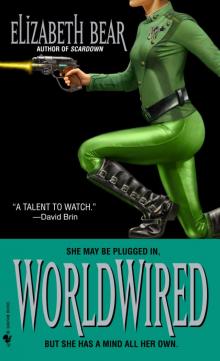 Worldwired
Worldwired Ancestral Night
Ancestral Night Hammered
Hammered The Red Mother
The Red Mother The Red-Stained Wings--The Lotus Kingdoms, Book Two
The Red-Stained Wings--The Lotus Kingdoms, Book Two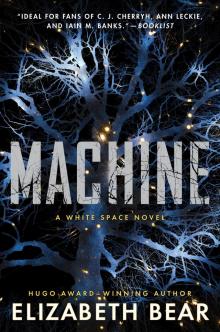 Machine
Machine Some of the Best from Tor.com: 2019 Edition
Some of the Best from Tor.com: 2019 Edition Faster Gun
Faster Gun In the House of Aryaman, a Lonely Signal Burns
In the House of Aryaman, a Lonely Signal Burns Stone Mad
Stone Mad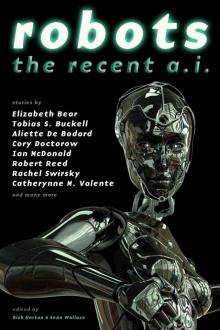 Robots: The Recent A.I.
Robots: The Recent A.I. The Tempering of Men
The Tempering of Men Boojum
Boojum Book of Iron bajc-2
Book of Iron bajc-2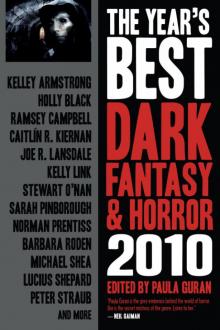 The Year's Best Dark Fantasy and Horror, 2010
The Year's Best Dark Fantasy and Horror, 2010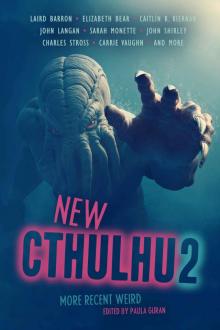 New Cthulhu 2: More Recent Weird
New Cthulhu 2: More Recent Weird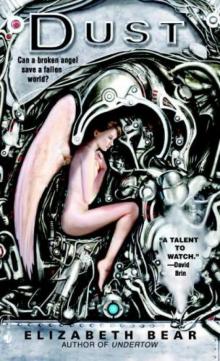 Dust jl-1
Dust jl-1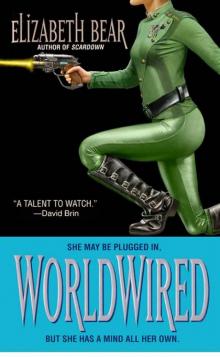 Worldwired jc-3
Worldwired jc-3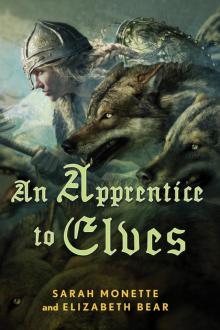 An Apprentice to Elves
An Apprentice to Elves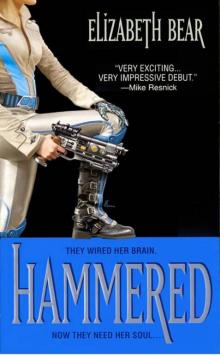 Hammered jc-1
Hammered jc-1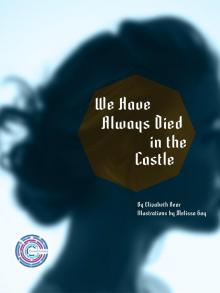 Crowd Futures: We Have Always Died in the Castle
Crowd Futures: We Have Always Died in the Castle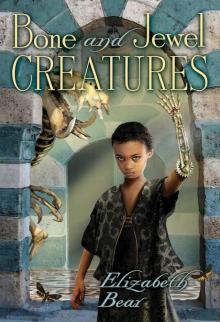 Bone and Jewel Creatures bajc-1
Bone and Jewel Creatures bajc-1 Carnival
Carnival Some of the Best from Tor.com: 2012 Edition: A Tor.Com Original
Some of the Best from Tor.com: 2012 Edition: A Tor.Com Original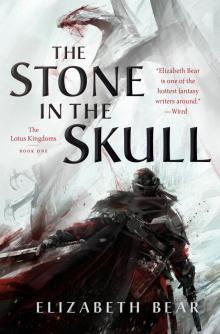 The Stone in the Skull
The Stone in the Skull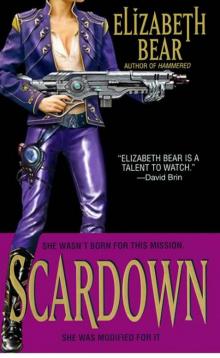 Scardown jc-2
Scardown jc-2 Hell and Earth pa-4
Hell and Earth pa-4 Undertow
Undertow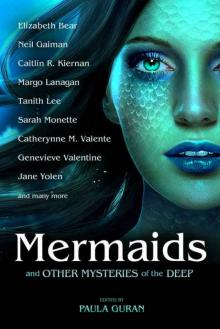 Mermaids and Other Mysteries of the Deep
Mermaids and Other Mysteries of the Deep A Companion to Wolves
A Companion to Wolves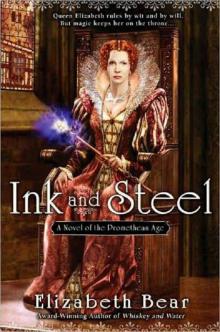 Ink and Steel pa-3
Ink and Steel pa-3